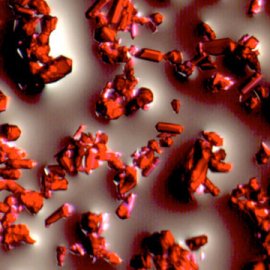Modern Alchemy: Drinking Water from Air
-
English
-
ListenPause
Welcome to World Ocean Radio I’m Peter Neill, Director of the World Ocean Observatory. In the middle ages, scientists and philosophers searched for transformation of things, to explore the nature of our physical world, to experiment with unknown elements and processes, and to explore the intersection between religion and observed phenomena, between philosophy and science. Alchemy. Some of its practitioners were ridiculed; some were persecuted; some were the creators of theories that became the basis for modern invention and technology; some number amongst history’s greatest thinkers. The most notorious search, of course, was for the conversion of base metals into gold – a pursuit that mixed ideas of altruism with greed, of intellectual discovery with power. The search has always continued and, while not gold, the results are found in modern expression as genetically modified substances, synthesized materials, nuclear physics, and other discoveries that have transformed our understanding of Nature, our ways of thinking, our values, and our behaviors. Such ideas and capabilities push our limits, test our strengths and weaknesses, and determine the success and failures of our societies and our lives. Let me offer an exhilarating contemporary example, an invention first published in 2017 in the journal SCIENCE and reported thereafter in the various articles in the Guardian, Wall Street Journal, CNN, NPR, Forbes, Newsweek, and other publications. And yet, given the implication of the discovery, such press coverage seems insufficient to say the least, as the technology discovered could radically, positively, possibly irrevocably change the world by meeting the challenge of the global water crisis, the effect of over-consumption, climate change, drought, and conflicts that threaten global security, for many today, for everyone tomorrow. Two teams of scientists from the Massachusetts Institute of Technology and the University of California, Berkeley, led by Professors Omar Yaghi and Evelyn Yang, have built and demonstrated an appliance “that pulls all the water household needs out of the air, even in dry or desert climates, using only the power of the sun.” We are aware of this potential and various primitive, indeed inexpensive, solutions to gather and conserve water: rainwater off roofs or fog catchers, nets erected to capture condensed water from humid air – actions that serve in some places and instances, but are vulnerable, uncertain, and without much upscale potential. Some have dehumidifiers in their homes – inefficient, power demanding, and useless in low humidity places or without access to very costly electricity. This is fundamentally different, and astonishing in its prospect. The appliance relies on a new system that, according to a UC, Berkeley press release, on materials derived by Dr. Yaghi, called Metal Organic Frameworks (MOFs), some 20 years ago, combining magnesium or aluminum with organic molecules to create miniature arrangements forming rigid, porous structures ideal for storing gasses and liquids, a technology that has found many uses, particularly in petro-chemical processing. In 2014, “Yaghi and his UC team synthesized a MOF combination of zirconium and adipic acid that binds water vapor and suggested to Dr. Wang, a mechanical engineer at MIT, that they join forces to turn the MOF concept into a water-collecting system.” And that they did -- by compressing MOFs between a solar absorber and a condenser plate, placed in a chamber open to the air, a device that in its first configuration tests showed “that one kilogram of the material could collect abut three quarts of fresh water per day, about enough to supply drinking water for one person, from air at 20% humidity,” powered at no cost by the sun. There are certainly many advances to be made to bring this to the utility and accessibility required, but, refine this, scale this, and you have a modern-day transformation with extraordinary social implication. Says Dr. Yaghi, “our vision is to have water off-grid where you have a device at home running on ambient solar delivering water the satisfies the needs of the household. I call it personalized water.” Personalized water. That is what is called for by the World Water Manifesto that established water as a basic human right that must be guaranteed to every person on earth in an amount required for individual survival. In a time when water is becoming industrialized, privatized, and controlled by corporate forces perhaps indifferent this critical societal need, the availability of water through such technology obviates ownership and provides from Nature and the water cycle, from the ocean/fresh water continuum, a base supply, water from air, an alchemy delivering liquid gold to everyone. This is “hydraulic society”; and it is all around us. We will discuss these issues, and more, in future editions of World Ocean Radio. - - - WORLD OCEAN RADIO IS DISTRIBUTED BY THE PUBLIC RADIO EXCHANGE AND THE PACIFICA NETWORK. FIND OUR PODCAST ON ITUNES, AND AT WORLD OCEAN OBSERVATORY DOT ORG.
In this episode of World Ocean Radio, host Peter Neill shares a technology first developed by a team of scientists from MIT and UC Berkeley that could radically change the world by mitigating the global water crisis.
About World Ocean Radio
Peter Neill, Director of the World Ocean Observatory and host of World Ocean Radio, provides coverage of a broad spectrum of ocean issues from science and education to advocacy and exemplary projects. World Ocean Radio, a project of the World Ocean Observatory, is a weekly series of five-minute audio essays available for syndicated use at no cost by college and community radio stations worldwide.
Resources from this episode
< Device Pulls Water From Air, Powered by the Sun (Berkeley News)
< Water Water Everywhere...Even in the Air (MIT News)
< New Solar-Powered Device Pulls Water Straight from the Desert (SCIENCE
Image
Crystalline materials similar to these can now harvest water vapor from the air.
Credit
Yaghi Laboratory at UC Berkeley
- Login to post comments



